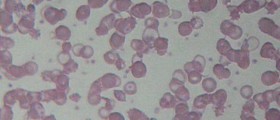Information on Ferrous Sulfate
Ferrous sulfate is a certain type of medication that is commonly used as a supplement for the diet of those who suffer from iron deficiency. Its most important benefit is that it provides the human body with iron which is a vital part of the production of red blood cells.
Ferrous sulfate is also sometimes referred to as iron sulfate, and it is very efficient in the treatment of medical conditions and diseases that can be caused by iron deficiency. The most common disease of them all is anemia. Iron deficiency can also sometimes be affiliated with pregnancy, excess bleeding, and numerous other types of health problems.

The human body gets iron from the daily diet, and it gets absorbed and added to hemoglobin and myoglobin. Hemoglobin serves the purpose of carrying oxygen to all the different tissues and organs in the body using the circulatory system. Myoglobin serves the purpose of aiding the muscle cells and tissues in storing precious oxygen.
Ferrous sulfate is an essential mineral that often gets recommended by the doctor as compensation for the lack of iron in the body. Ferrous sulfate is usually taken in the supplemental form, and it provides all the organs, tissues, and cells with precious amounts of oxygen. Ferrous sulfate can be taken in the form of pills, capsules, or syrup.
The pills are usually taken before meals, with plain water. It is not recommended to take ferrous sulfate pills with certain types of medications, such as antacids and antibiotics because it may trigger certain unwanted reactions. The tablets and capsules of ferrous sulfate should always be swallowed directly. The ferrous sulfate supplements in syrup need to be shaken before use.
One should always rely on a proper diet to ingest proper amounts of iron. The list of foods rich in iron includes green leafy vegetables, seafood, cabbage, chicken, asparagus, liver, broccoli, brown rice, kidney beans, pumpkin seeds, soybeans, and lentils.
Ferrous Sulfate Side Effects
Ferrous sulfate may sometimes be affiliated with certain allergic reactions such as itching, swollen areas, and skin rash. It can also trigger discoloration of the palms, lips, and nails. Other side effects of ferrous sulfate supplements may or may not include difficulty swallowing, painful sensations in the throat, dark stools, drowsiness, fatigue, abdominal pain, vomiting, nausea, indigestion, irregularities of the heartbeat, seizures, stomach ache, pale skin and bloody stools.
- Our aim was to quantify the odds of GI side-effects in adults related to current gold standard oral iron therapy, namely ferrous sulfate.
- Systematic review and meta-analysis of randomized controlled trials (RCTs) evaluating GI side-effects that included ferrous sulfate and a comparator that was either placebo or intravenous (i.v.) iron. Random effects meta-analysis modelling was undertaken and study heterogeneity was summarised using I2 statistics.
- Forty three trials comprising 6831 adult participants were included. Twenty trials (n = 3168) had a placebo arm and twenty three trials (n = 3663) had an active comparator arm of i.v. iron. Ferrous sulfate supplementation significantly increased risk of GI side-effects versus placebo with an odds ratio (OR) of 2.32 [95% CI 1.74-3.08, p
- Likewise, subgroup analysis of pooled data from 7 RCTs in pregnant women (n = 1028) showed a statistically significant increased risk of GI side-effects for ferrous sulfate although there was marked heterogeneity in the data (OR = 3.33, 95% CI 1.19-9.28, p = 0.02, I2 = 66.1%). Meta-regression did not provide significant evidence of an association between the study OR and the iron dose.

















Your thoughts on this
Loading...